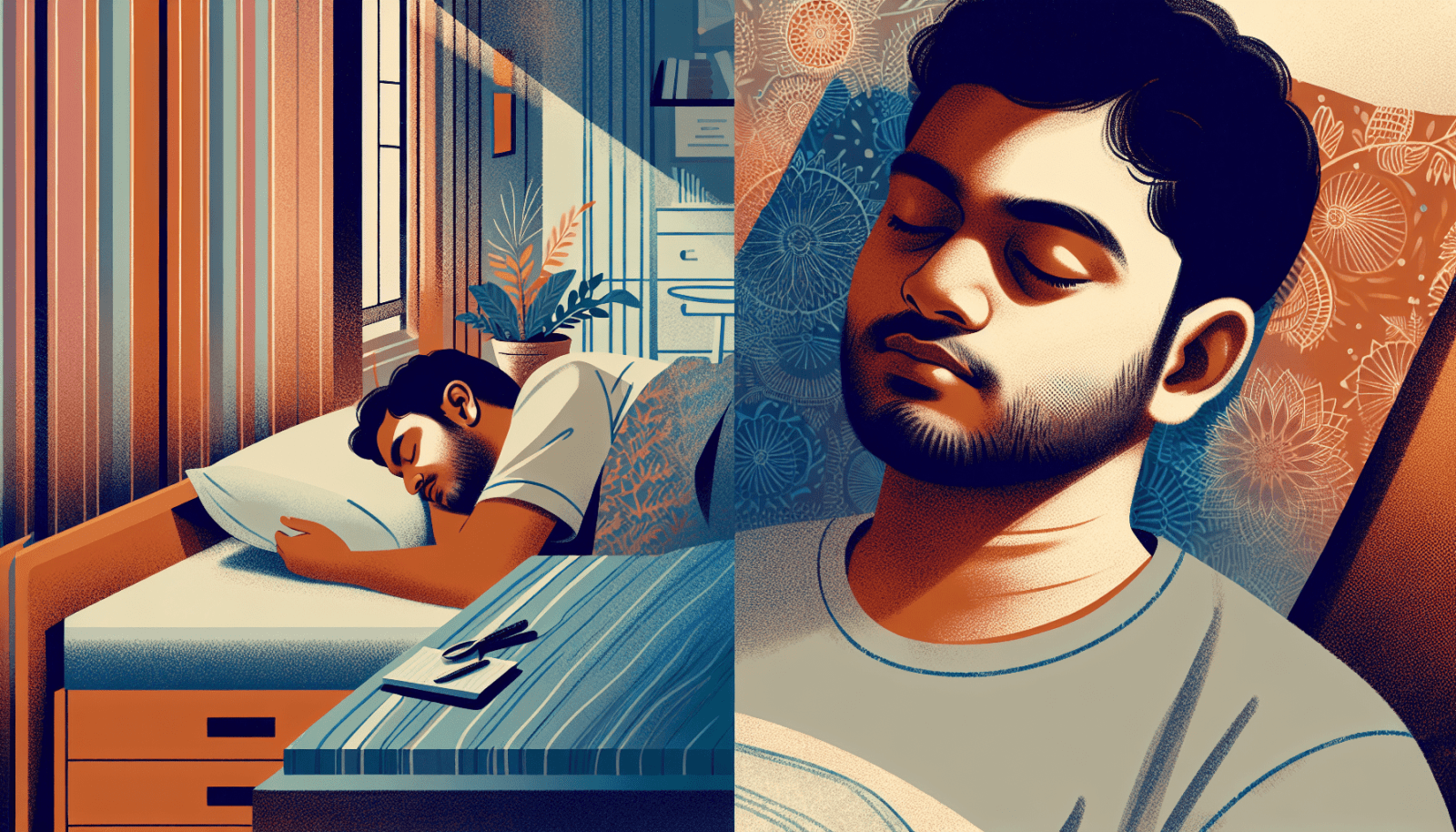Sleep and mental wellbeing are undeniably intertwined. Your mental health is greatly affected by the quality and quantity of sleep you get each night. In fact, research has shown that insufficient sleep can lead to various mental health issues such as anxiety, depression, and even cognitive decline. On the other hand, getting enough sleep can improve your mood, enhance your cognitive abilities, and promote overall mental wellness. So, it’s imperative to recognize the deep connection between sleep and mental wellbeing and prioritize achieving a good night’s rest for your own mental health.
Effects of Sleep Deprivation
Decreased Cognitive Function
Sleep deprivation can have a significant impact on your cognitive function. When you don’t get enough sleep, your ability to think clearly, concentrate, and make decisions may be impaired. The brain processes information and consolidates memories during sleep, so when you are sleep-deprived, your cognitive abilities suffer. You may find it harder to remember important information, solve problems, and learn new things.
Impaired Emotional Regulation
Lack of sleep can also affect your emotional regulation. When you are sleep deprived, you may find it more challenging to control your emotions and react appropriately to different situations. You may become more irritable, moody, and have difficulty managing stress. Additionally, sleep deprivation can lower your threshold for negative emotions, making you more susceptible to feeling overwhelmed or easily upset.
Increased Risk of Mental Health Disorders
Sleep deprivation is strongly linked to an increased risk of mental health disorders. Chronic sleep deprivation can contribute to the development of conditions such as depression and anxiety. Lack of sleep can disrupt the balance of important chemicals in the brain, like serotonin and dopamine, which play key roles in regulating mood and emotions. Moreover, sleep deprivation can exacerbate symptoms in individuals already living with mental health disorders, making it more challenging to manage their conditions effectively.
Sleep and Cognitive Functioning
Memory Consolidation
One of the critical functions of sleep is memory consolidation. While you sleep, the brain processes and stores the information you encountered throughout the day. It strengthens the neural connections associated with memory, ensuring that important information is retained and accessible when needed. Without sufficient sleep, this consolidation process is disrupted, and you may experience difficulties retaining and recalling information. Getting a good night’s sleep can significantly improve your memory and enhance your overall cognitive functioning.
Learning and Problem-Solving
In addition to memory consolidation, sleep also plays a crucial role in learning and problem-solving. During sleep, the brain consolidates the newly acquired knowledge and skills, making them more readily available for use. This process helps enhance your ability to learn efficiently and effectively. If you are sleep deprived, you may find it harder to concentrate, process new information, and find creative solutions to problems. Getting adequate sleep can enhance your cognitive abilities and optimize your learning potential.

Sleep and Emotional Regulation
Mood Regulation
Sleep has a profound influence on your mood regulation. Sufficient sleep is essential for maintaining emotional well-being and stability. When you are well-rested, you are better equipped to regulate your emotions, react appropriately to various situations, and experience more positive emotions. On the other hand, sleep deprivation can heighten negative emotions, increase feelings of irritability, and may even contribute to the development of mood disorders. Taking care of your sleep needs can go a long way in promoting emotional balance and overall mental wellbeing.
Emotional Resilience
Adequate sleep is crucial for building emotional resilience. When you are well-rested, you are better able to cope with stress, bounce back from setbacks, and maintain a positive outlook on life. Sleep deprivation weakens your emotional resilience, making it more challenging to handle challenging situations and regulate your emotions effectively. Prioritizing quality sleep can enhance your emotional resilience and help you navigate life’s ups and downs with greater ease.
The Role of Sleep in Mental Health
Reduced Risk of Depression
Getting sufficient sleep is associated with a reduced risk of depression. Sleep deprivation can disrupt the delicate balance of neurotransmitters and hormones in the brain, including serotonin, which plays a crucial role in mood regulation. This disruption can increase the likelihood of developing depression or exacerbate existing symptoms. By prioritizing sleep and ensuring you get enough rest, you can help protect yourself against depression and promote better mental health.
Improved Mental Health Treatment Outcomes
Quality sleep also has a significant impact on the outcomes of mental health treatment. When individuals with mental health disorders prioritize their sleep and establish healthy sleep habits, they often experience improved treatment outcomes. Proper sleep can enhance the effectiveness of medications, therapy, and other interventions, making it easier to manage symptoms and work towards recovery. By addressing sleep issues alongside mental health treatment, individuals can optimize their overall wellbeing and increase the likelihood of successful outcomes.

Sleep Disorders and Mental Health
Insomnia and Depression
Insomnia, a common sleep disorder characterized by difficulty falling asleep or staying asleep, is closely linked to depression. Insomnia can be both a symptom and a risk factor for depression. Persistent sleep difficulties can contribute to the development of depressive symptoms, and individuals with depression often experience disrupted sleep patterns. Treating insomnia can be an essential component of managing and preventing depression, as improving sleep quality can alleviate depressive symptoms and improve overall mental wellbeing.
Sleep Apnea and Anxiety
Sleep apnea, a sleep disorder characterized by interrupted breathing during sleep, has been associated with an increased risk of anxiety disorders. Disrupted sleep caused by sleep apnea can lead to chronic fatigue, impair cognitive function, and heighten feelings of stress and anxiety. Treating sleep apnea can significantly reduce anxiety symptoms and improve overall mental health. Proper management of sleep disorders is crucial for maintaining optimal mental wellbeing.
Tips for Better Sleep and Mental Wellbeing
Establish a Consistent Sleep Schedule
One of the most important steps towards better sleep and mental wellbeing is establishing a consistent sleep schedule. Try to go to bed and wake up at the same time every day, even on weekends. Consistency helps regulate your body’s internal clock, making it easier to fall asleep and wake up refreshed. Aim for around 7-9 hours of sleep each night to support optimal mental functioning and overall wellbeing.
Create a Relaxing Bedtime Routine
Creating a relaxing bedtime routine can help signal to your body that it’s time to wind down and prepare for sleep. Engage in activities that promote relaxation, such as reading a book, listening to calming music, or taking a warm bath. Avoid stimulating activities or screens before bed, as the blue light emitted by electronic devices can disrupt your sleep-wake cycle. By establishing a consistent and soothing routine, you can create an ideal environment for a restful night’s sleep.
Optimize Sleep Environment
Your sleep environment plays a significant role in the quality of your sleep. Ensure your bedroom is cool, quiet, and dark to create an optimal sleep environment. Invest in a comfortable mattress and pillows that provide adequate support for your body. Consider using earplugs or a white noise machine to block out disruptive noises, and use blackout curtains or an eye mask to eliminate any sources of light that may interfere with your sleep. By optimizing your sleep environment, you can create a space conducive to restful sleep.
Manage Stress and Anxiety
Stress and anxiety can greatly impact your ability to sleep well. Take steps to manage stress and anxiety throughout the day and before bed to promote better sleep and mental wellbeing. Engage in stress-reducing activities such as exercise, meditation, deep breathing, or journaling. Find healthy outlets to express your emotions and seek support from loved ones or a mental health professional if needed.
Limit Stimulants and Screen Time Before Bed
Aim to limit the intake of stimulants such as caffeine and nicotine, particularly in the evening. These substances can interfere with your ability to fall asleep and stay asleep. Additionally, minimize screen time before bed as the blue light emitted by electronic devices can disrupt the production of the sleep-inducing hormone melatonin. Instead, engage in relaxing activities that promote restful sleep. By reducing stimulants and screen time before bed, you can enhance your sleep quality and support your mental wellbeing.
Taking a holistic approach to sleep and mental wellbeing is essential for overall health. By recognizing the effects of sleep deprivation, understanding the role of sleep in cognitive functioning, emotional regulation, and mental health, and implementing helpful tips for better sleep, you can prioritize your rest and support your mental wellbeing. Remember, a good night’s sleep is a vital component of a healthy and balanced lifestyle.
